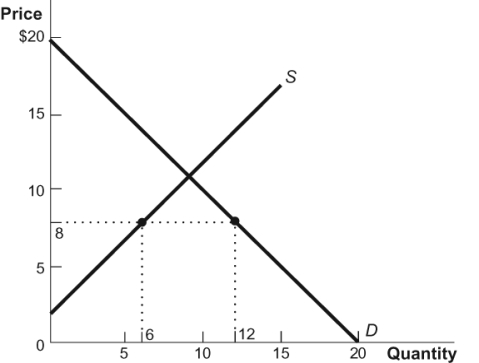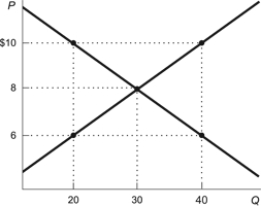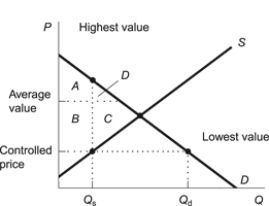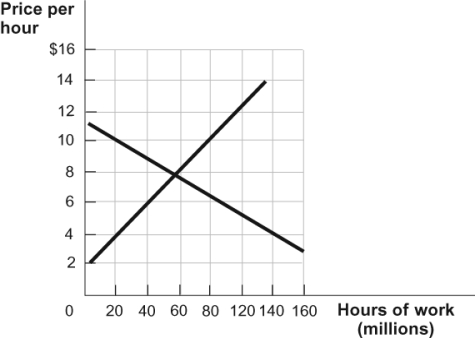Correct Answer

verified
Correct Answer
verified
Multiple Choice
Use the following to answer questions: Figure: Supply and Demand 4  -(Figure: Supply and Demand 4) Refer to the figure. If the good is purchased by those with the highest willingness to pay, what is the value of consumer surplus in the figure at the price ceiling of $8?
-(Figure: Supply and Demand 4) Refer to the figure. If the good is purchased by those with the highest willingness to pay, what is the value of consumer surplus in the figure at the price ceiling of $8?
A) $54
B) $136
C) $36
D) $45
Correct Answer

verified
Correct Answer
verified
Multiple Choice
Which statement about price ceilings is correct?
A) Whether a price ceiling is placed below or above the equilibrium price, it will always cause deadweight loss.
B) A price ceiling will only cause deadweight loss if it is placed above the equilibrium price.
C) A price ceiling will only cause deadweight loss if it is placed below the equilibrium price.
D) Whether a price ceiling is placed below or above the equilibrium price, it will always cause a shortage of the good.
Correct Answer

verified
Correct Answer
verified
Multiple Choice
Use the following to answer questions: Figure: Price Controls  -(Figure: Price Controls) Refer to the figure. Which price control would cause a shortage of 20 units of the good?
-(Figure: Price Controls) Refer to the figure. Which price control would cause a shortage of 20 units of the good?
A) a price ceiling of $10
B) a price floor of $10
C) a price ceiling of $6
D) a price floor of $6
Correct Answer

verified
Correct Answer
verified
Multiple Choice
The blat economy described in the text results when price controls are:
A) extensive and cause chronic shortages in the economy.
B) extensive but the causes of shortages in the economy are only temporary.
C) short-lasting but cause chronic shortages in the economy.
D) short-lasting and cause only temporary shortages in the economy.
Correct Answer

verified
Correct Answer
verified
Multiple Choice
Use the following to answer questions: Figure: Price Ceilings and Random Allocation  -(Figure: Price Ceilings and Random Allocation) Refer to the figure. When a controlled price is imposed and the quantity of goods is allocated randomly between the highest-valued uses and lowest-valued uses, loss due to random allocation instead of allocation to the highest-valued use is represented by area:
-(Figure: Price Ceilings and Random Allocation) Refer to the figure. When a controlled price is imposed and the quantity of goods is allocated randomly between the highest-valued uses and lowest-valued uses, loss due to random allocation instead of allocation to the highest-valued use is represented by area:
A) A.
B) B.
C) C.
D) D.
Correct Answer

verified
Correct Answer
verified
Multiple Choice
A price ceiling is a(n) :
A) legally established minimum price that can be charged for a good.
B) illegally established minimum price that can be charged for a good.
C) legally established maximum price that can be charged for a good.
D) illegally established maximum price that can be charged for a good.
Correct Answer

verified
Correct Answer
verified
Multiple Choice
Deregulation improves the allocation of resources by:
A) allocating more resources to the firms.
B) decreasing the number of firms in the market.
C) allowing low-cost, innovative firms to enter the market.
D) creating more market opportunities to the firms.
Correct Answer

verified
Correct Answer
verified
Multiple Choice
When a price ceiling is binding, the goods that are on sale are allocated to buyers using a method:
A) of random allocation.
B) whereby the highest bidder wins.
C) whereby the lowest bidder wins.
D) whereby buyers purchase lottery tickets to see who will be able to buy the product.
Correct Answer

verified
Correct Answer
verified
Multiple Choice
Do price ceilings misallocate resources?
A) Yes, because people who value the good the most are unable to bid it away from low-valued uses.
B) Yes, because people who value the good the least are unable to afford the good.
C) No, because the good is still allocated based on willingness to pay.
D) No, because the rich and poor alike stand an equal chance of getting the good.
Correct Answer

verified
Correct Answer
verified
Multiple Choice
Which observation would be consistent with the impact of price ceilings?
A) Books are printed on higher-quality paper.
B) Full-service gasoline stations stay open for 24 hours.
C) New automobiles are painted with more coats of paint.
D) Newspapers switch to a smaller font size in order to decrease bulk.
Correct Answer

verified
Correct Answer
verified
True/False
Prices ceilings misallocate resources because with them resources are not necessarily allocated to their highest-valued use.
Correct Answer

verified
Correct Answer
verified
Multiple Choice
Which statement would be the least likely result of rent controls?
A) Landlords are more selective with respect to the people they rent apartments to.
B) Landlords provide less maintenance on the apartments.
C) More new apartments are available for rent.
D) More people look for apartments for rent than the number of apartments available.
Correct Answer

verified
Correct Answer
verified
Multiple Choice
Southwest Airlines was able to enter the national market in 1978 as a result of:
A) winning a series of lawsuits.
B) accumulating market share.
C) airline deregulation.
D) establishment of new price controls.
Correct Answer

verified
Correct Answer
verified
Multiple Choice
Which scenario shows how the Russian concept of blat works during a beef shortage?
A) a politician acquires some steak through his friendship with the owner of the beef factory
B) a beef factory owner hoards some steak at his own house
C) a beef factory owner realizes that there is a surplus of plastic wrapping
D) more people than usual stand in line to try to buy steak
Correct Answer

verified
Correct Answer
verified
True/False
When a crisis in the Middle East reduces the supply of oil, the price system rationally responds by reallocating oil from highest-value uses to lower-valued uses.
Correct Answer

verified
Correct Answer
verified
Multiple Choice
Rent controls create all of the following EXCEPT:
A) shortages.
B) search costs.
C) wasteful quality increases.
D) resource misallocations.
Correct Answer

verified
Correct Answer
verified
Multiple Choice
Use the following to answer questions: Figure: Labor Market 1  -(Figure: Labor Market 1) Refer to the figure. If there is a price ceiling set at $6, how much shortage or surplus, if any, is there?
-(Figure: Labor Market 1) Refer to the figure. If there is a price ceiling set at $6, how much shortage or surplus, if any, is there?
A) 60 million hours
B) 80 million hours
C) 120 million hours
D) There is no shortage and no surplus.
Correct Answer

verified
Correct Answer
verified
Multiple Choice
If, under price control, quantity supplied equals 50 units and quantity demanded equals 40 units, then the price control is a __________.
A) binding price ceiling
B) binding price floor
C) nonbinding price ceiling
D) nonbinding price floor
Correct Answer

verified
Correct Answer
verified
Multiple Choice
The U.S. Congress first instituted the minimum wage in:
A) 1914.
B) 1974.
C) 1938.
D) 1925.
Correct Answer

verified
Correct Answer
verified
Showing 281 - 300 of 325
Related Exams